This question comes up regularly, and I like how you phrased it.
More about the problem
For onlookers, I will print out the plan and the graph of the current (problematic) workflow.
library(drake)
plan <- drake_plan(
sub_task = runif(1000, min = mean__, max = 50),
full_task = sub_task * 2
)
step <- 1:4
full_plan <- evaluate_plan(
plan,
rules = list(
mean__ = step
)
)
full_plan
#> # A tibble: 5 x 2
#> target command
#> <chr> <chr>
#> 1 sub_task_1 runif(1000, min = 1, max = 50)
#> 2 sub_task_2 runif(1000, min = 2, max = 50)
#> 3 sub_task_3 runif(1000, min = 3, max = 50)
#> 4 sub_task_4 runif(1000, min = 4, max = 50)
#> 5 full_task sub_task * 2
config <- drake_config(full_plan)
vis_drake_graph(config)

Created on 2018-12-18 by the reprex package (v0.2.1)
Solution
As you say, we want full_task_* targets that depend on their corresponding single_task_* targets. to accomplish this, we need to use the mean__ wildcard in the full_task_* commands as well. Wildcards are an early-days interface based on text replacement, so they do not need to be independent variable names in their own right.
library(drake)
plan <- drake_plan(
sub_task = runif(1000, min = mean__, max = 50),
full_task = sub_task_mean__ * 2
)
step <- 1:4
full_plan <- evaluate_plan(
plan,
rules = list(
mean__ = step
)
)
full_plan
#> # A tibble: 8 x 2
#> target command
#> <chr> <chr>
#> 1 sub_task_1 runif(1000, min = 1, max = 50)
#> 2 sub_task_2 runif(1000, min = 2, max = 50)
#> 3 sub_task_3 runif(1000, min = 3, max = 50)
#> 4 sub_task_4 runif(1000, min = 4, max = 50)
#> 5 full_task_1 sub_task_1 * 2
#> 6 full_task_2 sub_task_2 * 2
#> 7 full_task_3 sub_task_3 * 2
#> 8 full_task_4 sub_task_4 * 2
config <- drake_config(full_plan)
vis_drake_graph(config)

Created on 2018-12-18 by the reprex package (v0.2.1)

